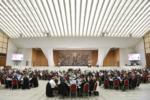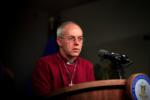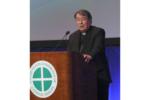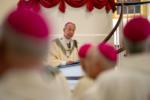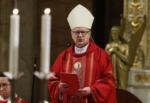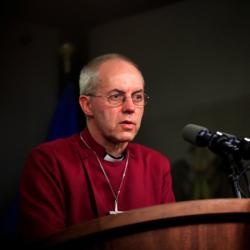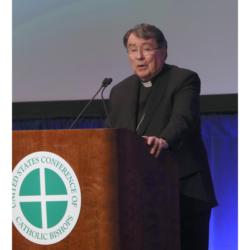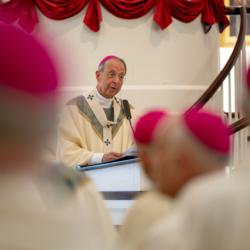Reflections on the International Conference for Parish Priests on Synodality
Remember the last "discussion" you had, trying hard to get your point across but frustrated because they weren't listening to you? In all honesty, that one-sided interaction was probably mutual with words passing back and forth but neither side actually listening. Perhaps, unfortunately, there was lots of "hearing," not much "listening," with each side poised to make their point -- again -- when a breath is taken! After all, in an argument (sorry, "discussion"), the goal is to win, not to come to a common solution or compromise. This non-dialogue process is not unique but prevalent on the world stage, in our government, and in our church, parishes, and families.
Very often, in our parish councils and organizations, the resolution to opposing opinions is decided by a "vote" -- or the final decision is left to the pastor. In all these "non-listening discussions," wouldn't it be more productive to truly listen to the other position? In a church setting, wouldn't it be a better option to recognize the baptismal rite and responsibility of every person? Wouldn't it be "refreshing" to remember that the Holy Spirit works through everyone, not just you? Wouldn't it be challenging to open ourselves to a goal that is about the common good rather than just a one-sided good? That refreshing and challenging process is the purpose of Pope Francis in convening last year's Synod on Synodality, which will conclude its second session in October. The Holy Father is calling for a future church that embraces a spirit of synodality on its continued journey toward the Kingdom of God.
Synodality. Yes, it is a unique term, even to say. (The accent is on the first syllable, not the last -- SYN-od, not sy-NOD.) The pope is raising some important concerns in convening these meetings. Although, in the past, synods brought bishops together for their input and advice, at these two meetings, Pope Francis has extended the invitation to clerics and laity alike. In fact, at the end of April, there was an international conference for parish priests held for four days in Rome. Two hundred priests from around the world shared thoughts, ideas, and visions, building toward a worldwide church that embraces synodality. It was a special grace to participate in those sessions. They helped me and many others appreciate the pope's insistence on implementing this process. He sees synodality as a new way to be church -- a vibrant exchange from the top down and from the bottom up. There are some focused themes and a few key concepts to consider.
The process is called "The Conversation in the Spirit." The role of the Holy Spirit in all discussions is essential. It is trusting the Spirit, invoking the Spirit, and listening to the Spirit working through everyone. This role of the Holy Spirit must intervene on all levels of the church, with the ordained and the non-ordained, especially encouraging the role and responsibility of the laity on the local level. The approach is not new. Without using the term, Lumen Gentium from Vatican II defines synodality well:
". . . The Holy Spirit not only sanctifies and guides God's people by the sacraments and the ministries, and enriches it with virtues, it also distributes special graces among the faithful of every state of life, assigning gifts to each as he chooses. By means of these special gifts, he equips them and makes them eager for various activities and responsibilities that benefit the church in its renewal or its increase, in accordance with the text: 'To each is given the manifestation of the Spirit for a good purpose.' These charisms, the simpler and more widespread as well as the most outstanding, should be accepted with a sense of gratitude and consolation, since, in a very special way, they answer and serve the needs of the church." (LG, 4)
Once we pay active attention to the Holy Spirit in prayer, the next step is having respect for each other. After prayer and respect are exercised as the ground of all actions and decisions, then openness, listening, understanding, and discernment can reveal new ideas, building a unity in our diversity for the purpose of mission and evangelization of the church. We are all on this journey together in building up the Kingdom of God.
Practically speaking, we need to understand that the church doesn't "have" a mission; the church is a mission, grounded in Jesus Christ. Synodality means being open to new and creative possibilities that encourage creativity for the good of the mission. On the parish level, the practice of synodality would direct the flow of all its meetings. It would organize opportunities for all its members to have a voice, to offer advice, and to be a part of the implementation of goals and visions. In its most challenging mode, synodality is about transformation and conversion.
Consider the possibility of a parish "conversation in the Spirit." It begins with the initial preparation of the participants to entrust themselves to the Trinity through silence, prayer, and listening to the Word of God. Next, each person offers their concerns about the topic at hand. At this point, each member should be actively listening to the speaker, trying to understand his or her point. This is a time for listening, not debating. More silence and prayer help to absorb what has been offered, followed by sharing how the contributions have touched one's personal thought. From what I heard, what resonates with me? This is a sharing of the heart. After more prayer, working together with all that has been offered, the group could come to a consensus, or a prayer for discernment and decision. This is a time to thank the Holy Spirit for the intervention and grace.
As this process of Spirit-based dialogue and discernment evolves, a conversion can take place for the parish priests, staffs, lay leaders, and everyone in the parish. It calls all to be open to change. The synodal process welcomes everyone to feel a sense of belonging, insisting that they are valued for who they are and for what they think. One of the challenging components is not only how issues and concerns are raised but also how decisions are made. We need a new, deeper way of being church in today's world. To achieve this, we need to develop the habits of spiritual discernment. Discernment is learning to distinguish between spirits. Everyone knows the pastor is ultimately responsible for the decisions and choices made for the parish, but his openness and oversight can bring new life and excitement as the parish shifts from "how we always did it in the past" to "how we can do it in the future." Synodality is grounded in prayer, insight, respect, mission, and our trust in the Holy Trinity.
The synodal process does not ignore, reduce, or negate the teachings of the church. In fact, it reminds us of the opening statement of Pope John XXIII that the Second Vatican Council was not convened to define dogmas -- the councils in the past did that -- but, aided by the Holy Spirit, to discover new ways in which the dogma and teaching are presented in a relevant and effective evangelization for today's world. Pope Paul VI would reemphasize this goal in his encyclical on evangelization, which called all the baptized to be missionaries of Jesus Christ.
From a group of excellent theologians at the synod meeting in April, we learned a lot and were reminded of how effective prayerful, creative evangelization can enhance the mission of the church. Theologian Father Tomas Halik of Charles University in Prague offered some reflective insights. He suggested that synodality is a journey -- a transition and, like the Exodus, a pilgrimage to freedom. It requires the courage to convert from a static "being Christian" to a dynamic "becoming Christian"; to move forward from the known to the unknown, from the present to the future that God is preparing for us. He stressed that mission is not to be confused with proselytism, the mere effort to increase the number of church members. Evangelization is the process of "enfleshing" the Gospel, the Word of God, into a living culture that honors our individual gifts and, in that diversity, unites us with the gifts of others.
In active parish listening, we will build a solidarity with the people of our time, their joys and hopes, their anguish and pain, which the church at the Second Vatican Council recognized is a demanding task. Synodality is a return to the sources. Common discussion and decision-making characterized the church not only in apostolic times but also in later councils and synods. We should remember that the church was born at Pentecost as a sacrament of understanding. By the power of the Holy Spirit, the Apostles could address people of different cultures and languages with clarity and conviction.
Implementing a shift to synodality will take time and patience. The goal is mission. The goal is respect. The goal is all of us taking our journey to the Kingdom seriously -- calling each baptized person to accept their commitment. Imagine having a conversation or a committee "discussion," in which you listened and understood another's position, and you felt people listened and understood yours. Synodality -- a hope from Pope Francis, listening to the words spoken to St. Francis -- "Rebuild my church!" Praise to the Father, Son, and Holy Spirit.
FATHER ROBERT L. CONNORS IS THE EPISCOPAL VICAR FOR THE SOUTH REGION OF THE ARCHDIOCESE OF BOSTON. ALONG WITH FATHER PAUL SOPER, HE PARTICIPATED IN A MEETING OF 200 PRIESTS FROM AROUND THE WORLD WHO MET AT A RETREAT CENTER OUTSIDE OF ROME APRIL 29-MAY 2 TO PROVIDE INPUT TO THE SYNOD OF BISHOPS ON SYNODALITY.


